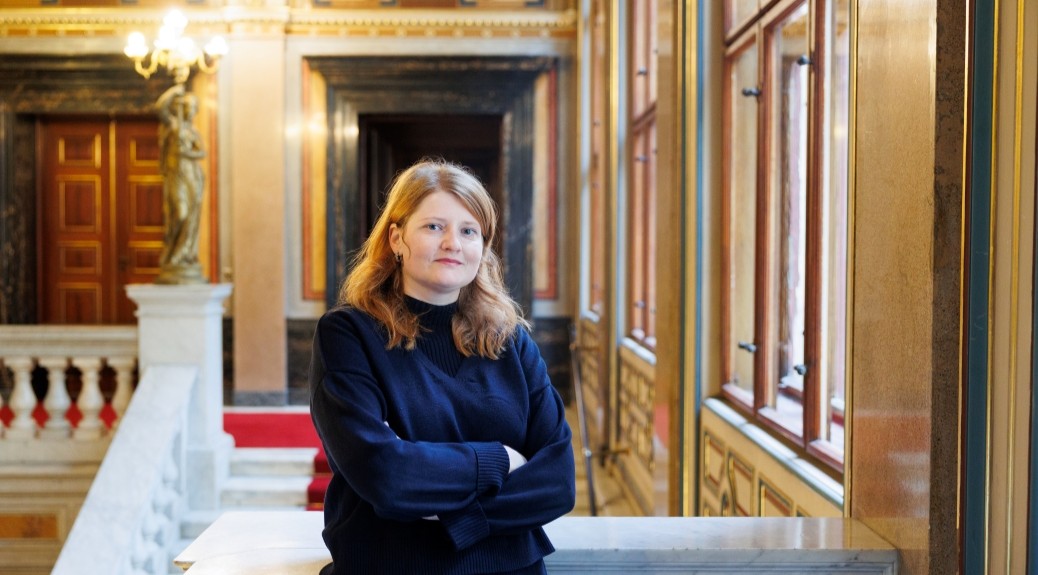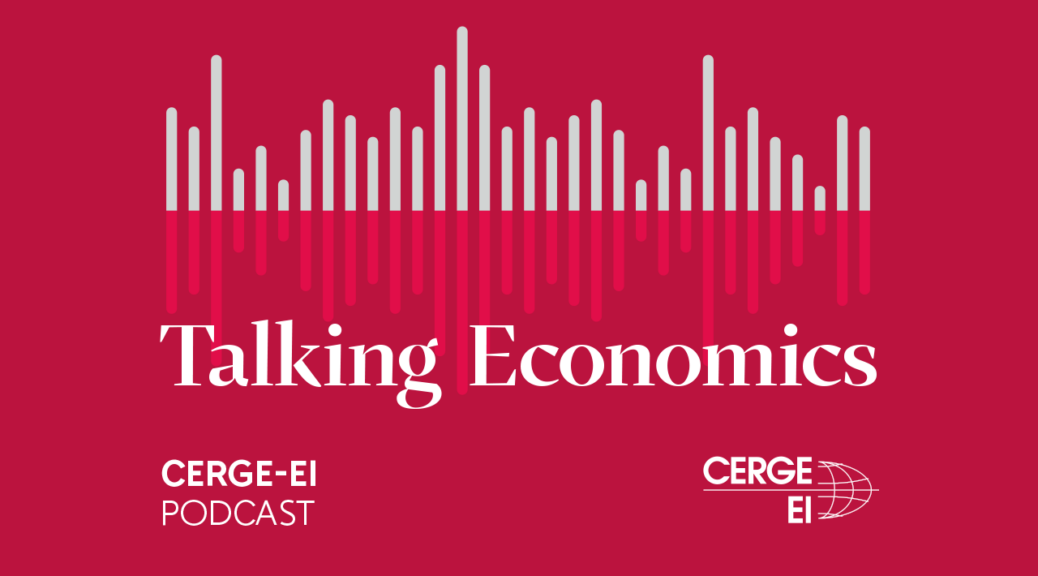From Prague to Berkeley, this interview traces the academic and personal journey of our PhD student Tereza Burýšková, who spent a study stay
at the University of California, Berkeley. Her experiences open a new interview series titled Places You’ll Go, sharing reflections on the decision-making process, cultural adjustments, and differences in academic environments. The interview aims to encourage other students to take a similar step. It offers an honest look at what it means to move beyond one’s comfort zone. Continue reading Confidence, Curiosity, and California: Reflections on a Study Stay
Tag Archives: interview
Who Pays for Policy? Find it out with Stephanie Ettmeier
Trained across disciplines and shaped by moments when economic policy moved from abstraction to real-world consequence, Stephanie Ettmeier, PhD, Assistant Professor at CERGE-EI, brings a distinctive perspective to contemporary macroeconomics. In this interview, she reflects on her unconventional path into the field, her motivation for joining CERGE-EI, and the questions that animate her research—from the effects of fiscal austerity to new methods for understanding how aggregate shocks are experienced across households, firms, and regions. Bridging historical insight with cutting-edge empirical tools, Ettmeier’s work highlights why looking beyond averages is essential for both economic research and policy today. Continue reading Who Pays for Policy? Find it out with Stephanie Ettmeier
Meet Our Students: Sook Yan Siew
Sook Yan Siew shares her experiences as a PhD in Economics student at CERGE-EI and her role as an international student ambassador at Charles University. Looking ahead, she is considering a future in academia while also running her own NGO. She believes this path will allow her to balance her passion for long-term theoretical research with short-term practical work. Continue reading Meet Our Students: Sook Yan Siew
Rebeka Hoblik – Student Experience of the Master in Economic Research Program at CERGE-EI
In this short interview, Rebeka Hoblik shares her experience as a student in the Master in Economic Research program at CERGE-EI. She is currently in her second year and holds both American and Czech citizenship. After graduating from high school in the United States, she earned her Bachelor’s degree in Business Administration from Anglo-American University in Prague. In the future, she plans to pursue research roles in economics. Continue reading Rebeka Hoblik – Student Experience of the Master in Economic Research Program at CERGE-EI
Silvester van Koten: We Need to Address the Shortage of Oil and Gas
Russia’s invasion of Ukraine has boosted the already high prices of oil and gas in the European Union. How come the energy situation in the EU is so dependent on Russia? What are the prognoses for energy costs and related costs of living for the near future? In Talking Economics, Katarína Stehlíková chats with Silvester van Koten, a CERGE-EI PhD in Economics alumnus, about War on Ukraine’s effect on European energy. Continue reading Silvester van Koten: We Need to Address the Shortage of Oil and Gas
Teaching on the Frontier: An Interview with PhD Student Tomáš Miklánek
Education in economics is one of the least reformed areas in the post-communist world. University classrooms across the former Soviet bloc severely lack motivated and professional economic instructors. Poor instruction engenders future thinkers, voters, and leaders with distorted or no understanding of modern economic principles. Young people are robbed of a quality education that can aid them in thinking critically about the problems facing their societies. This subsequently impedes the prospects for greater openness, growth, and prosperity in this important part of the world.
CERGE-EI Teaching Fellowship Program supports dedicated young men and women who enter undergraduate classrooms across the region to teach modern, market-based economics to the next generation. Teaching with novel methods and modern textbooks, fellows introduce new ways of thinking. Beyond their strong impact in the classroom, the fellows demonstrate best practices to other faculty members, raising quality throughout their host institutions.
Tomáš Miklánek, a CERGE-EI PhD Student from Slovakia, wanted to make a contribution to the future prosperity of the region and decided to join the Teaching Fellows Program to teach a course. Teaching in the classroom is never an easy thing, but Tomáš had his mind set on an even bigger challenge. Rather than teach in his native Slovakia (or in the Czech Republic, a close cultural and linguistic cousin), Tomáš decided to teach in Voronezh, Russia, a remote city in Southwestern Russia.
Why did he choose Voronezh? What experiences and impact did he have there? Watch the brief video interview with Tomáš to learn more!
VIDEO INTERVIEW: Monetary-Fiscal Interaction, the Euro Crisis, and More with Dr. Jan Libich
What is the connection between monetary and fiscal policy? How do the interactions between them explain the global financial crisis and its aftermath? Dr. Jan Libich, senior lecturer at La Trobe University in Melbourne, is deeply interested in questions of monetary and fiscal interaction and how an understanding of them may provide solutions to today’s difficult global economic problems.
Dr. Libich visited CERGE-EI in January to discuss his paper, ‘Monetary Exit Strategy and Fiscal Spillovers’. While here in Prague, Dr. Libich sat down for an interview with CERGE-EI student Dejan Kovac to discuss his economic research and policy suggestions. Topics of discussion included: interactions between government’s fiscal policy, the central bank’s monetary policy, the prospects of the European monetary union, sustainability of public finances, the global financial crisis, the future of inflation targeting, and aging populations.Watch the full video interview (in HD) here!:
httpv://www.youtube.com/watch?v=eCOZQWOTd3o
Dr. Jan Libich is a senior lecturer at La Trobe University in Melbourne and the School of Economics, VŠB-TU Ostrava.
Searching for Answers with Dr. Adam Sanjurjo
Dr. Adam Sanjurjo (University of Alicante) researches search behavior in ‘rich search environments.’ As he writes in a recent paper, “we consider much more than wage when choosing a job, and much more than price when purchasing a home.” How to optimize the way we search and the ultimate decisions we make is still not well understood, but Dr. Sanjurjo is searching for answers. Check out Dr. Sanjurjo’s brief interview during his visit to CERGE-EI in Prague:
Who is someone who influenced your decision to become an economist?
Well maybe I shouldn’t say this, but I think it was more of a compromise. For a lot of people who do economics, it’s a compromise, because they like math and they also like psychology. And that was the case for me. As an undergrad I wasn’t as enthusiastic about my economics classes as my math classes. But economics allows the whole continuum between pure math and pure psychology. I felt that I could have that whole continuum to work with, and I think it was a pretty good strategy.
What are you working on now?
Many things, but my main line of research is search behavior in rich search environments. So for example you want to choose a house, so you’re going to evaluate a bunch of different houses on a bunch of different dimensions. How do you search that information, what information do you search, and in what order do you search that information? And how does the order that you search in affect the choices you are going to make?
I’d say a lot of my work falls under the veil of heuristics and biases, relating to the original work of Kahneman and Tversky in their 1973 paper. It has a lot to do with how people think about probabilities, and how they have systematic biases in the way they evaluate subjective probability.
Where do you get inspiration to start doing your research?
Well that’s pretty clear. The reason I went to do PhD in economics is because I was kind of obsessed with the idea of modeling first impressions. Somehow that quickly turned into the study of information overload. I felt like information overload was affecting me in my life and a lot of people around me. It was very salient for me. And actually the rich search stuff I’m doing now stays true to that. I think I’m approaching it in a slightly more responsible way than when I first started. So now I’m trying to find concrete mechanisms that cause people to get confused or overwhelmed in complicated decisions, and even in decisions that aren’t so complicated. We get confused.
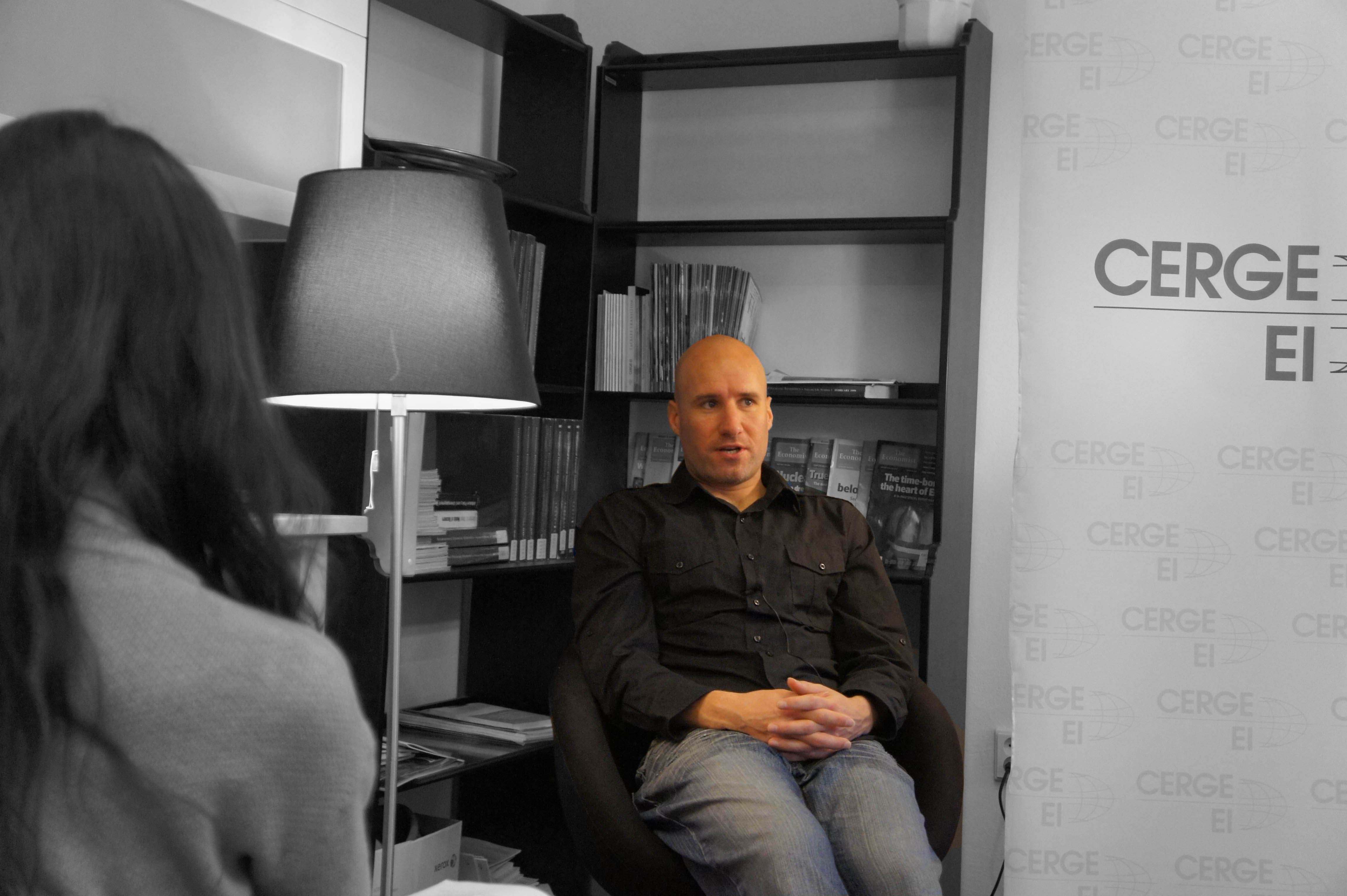 So this research can be applied quite generally?
So this research can be applied quite generally?
With the multiple attribute search stuff, I think this is a framework that applies to all decision making. So we’re not aware of the fact that we’re evaluating choices on multiple dimensions, and yet we’re doing it all the time. We’re integrating multiple dimensions in evaluating what decision to make, for every decision we make, and we’re making decisions constantly. I’m making decisions right now; I’m choosing which words to use, which sentences to string together, which topics to talk about
And what are your main concerns?
Sometimes I get the feeling when I present this material that it’s very interesting, but it’s also very eclectic for many economists. I personally don’t think it’s eclectic at all, because I think it applies to all decision making. But it’s eclectic in the sense that not much formal work has been done on it, because they’re very rich search problems and thus hard to study. So people have steered away from them because they’re hard problems to work with. But that doesn’t mean they’re not important problems to study.
How do you think your field will look in ten years?
I don’t think it will look very different. There’s kind of a ‘holy grail’ in my field, which is to be able to analytically solve what’s the best way of searching in these rich search problems. I don’t think that’s going to happen any time soon. However I think the ability to numerically solve for what’s the best way to search in these environments is going to get better. People are going to do impressive things in terms of having these very rich search problems that are similar to the way that people search for information on the internet. So you’re not only going to be able to see how people search, but also ‘how they ought to search’. I think that will be an exciting advancement.
What do you think of CERGE-EI?
From what I’ve seen, it’s a beautiful place, and I’m very excited with the faculty here. There are a lot of people who are interested in search and bounded rationality. I’m looking forward to meeting everyone else.
Interviewer: Tamta Bakhtadze
21 January 2013
A Brief Chat with Professor Andreas Ortmann
CERGE-EI discussed lab rats and experimental economics, among other things, with visiting senior lecturer Andreas Ortmann:
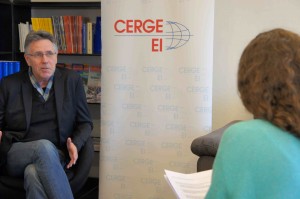 You are interested in experimental and behavioral economics. Why did you choose this field and who influenced your decision?
You are interested in experimental and behavioral economics. Why did you choose this field and who influenced your decision?
It’s a funny story. To earn my Ph.D., I went to Texas A&M University where one of the first and prominent experimentalists in the US was working. But I didn’t go there to study experimental economics, I went to study industrial organization and public finance. In fact, I never heard about experimental economics. But … I needed to earn money and so I started working for this professor called Ray Battalio – a brilliant guy and real mensch – who conducted experiments with animals (I was a rat-lab technician!) and humans. Even though I was very skeptical at first, experimental economics grew on me and I became interested in it as one way of understand economic problems.
But it’s only one way. It’s not the only way. I also do theory, I do history of thought, and even empirical work if I have to. I don’t believe in one method alone. You take what’s appropriate to understand and solve the problem .
Today a lot of people are doing these types of experiments. How do you see the field changing in the future?
There are lots of issues that experimental economists need to address. For example, there is always the question of external validity of experiments, i.e., the question to what extent laboratory results tell us anything about the real world.
There are also all kinds of issues of how to do the econometrics, and how to evaluate the evidence that is being produced in experiments. Experimental economists mostly talk about statistical significance, but this is really not that interesting if the effect size turns out to be miniscule. You want to talk about economic significance, which is a different concept. We may actually have the wrong tools for understanding these experiments, at least for some of the big issues which we need to address.
What are your current research interests?
Which of my 273 would you like me to talk about? (laughs) Well I’m working on, among other things, evidence production and evaluation. I’m working obviously on what I talked about in my seminar at CERGE-EI: social-impact bonds, which is a recent addition to my research agenda . I’m also working on simple heuristics. Fast and frugal ways of making decisions which contradict some of the basic ideas that economists have on how we make decisions. We usually assume common and full knowledge and rationality when actors make decisions, and I think the evidence shows that under time-constraints and uncertainty we don’t have a lot of time to make decisions and we don’t have full information. We make decisions on incomplete information, and this is one of the big issues I am focusing on.
How do you get inspiration from your research?
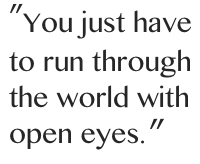 It’s a difficult question because I think there is no algorithm for it. You just have to run through the world with open eyes. And sometimes you have to dive very deeply into a particular topic to understand what kind of open questions there are. Sometimes it just hits you—you say ‘why?’ and then you just go for it.
It’s a difficult question because I think there is no algorithm for it. You just have to run through the world with open eyes. And sometimes you have to dive very deeply into a particular topic to understand what kind of open questions there are. Sometimes it just hits you—you say ‘why?’ and then you just go for it.
I think it is fair to say that it has to do, for the most part, with knowing a field well and reading thoroughly. Of course it helps if you read broadly and don’t just focus on one particular topic. And it always is useful to talk and work with different people with different experiences. There are various strategies to get inspirations and they can all be equally valuable.
Do you usually find unexpected results from your studies?
At my age, little surprises me (laughs). But of course, that’s why we do experiments. You do it because you have a theory and you do an experiment to understand if your theory predicts properly. And sometimes the evidence seems to reject the theory that you tested.
Much of laboratory research is being done precisely because theories didn’t predict properly, and then you try to understand what’s going on. You essentially give theorists more grist for the mill to come up with better theories to explain lab results. Of course there are often situations where a theory doesn’t predict well, and it’s a big surprise. Then you have to go on and try to do better. Write better theories, do new experiments. This is the cycle: theory, experiments, theory, evidence, theory, more evidence, more theory, and so on.
You have written many papers, so you may be the right person to ask the burning question of all young PhD students: where do you see the research gap?
You are asking for the low-hanging fruit, yes? (laughs). It’s an interesting question. It’s a little like the famous efficient market argument: there can’t be money on the street, because if there were, someone would already have picked it up. But that’s not true, because there is always new money being dropped, essentially. There are always new research opportunities. The world is changing and there are always new ideas being generated. In order to understand what’s a new idea, typically it takes some experience and some feeling for what constitutes a good story.
But there are many situations where you come up with something new to the field because you are not caught in this paradigm. So you might see that something is interesting where mainstream economists would never see it. There are so many examples of this.
What is the competitive advantage of CERGE-EI students in choosing a research topic? Since most of the student body is from post-socialist regions, is this the area where they should focus their research?
There shouldn’t be a ‘should’ here. In the first place you must try to become a good economist. After that, if you want to go back to your country, I’m sure you will have plenty of questions and problems to deal with. Just become the best economist you can be, and there will be plenty of opportunities to apply your knowledge.
I can say that good economists are badly needed in the region. Many of the policy decisions are not informed properly by good economics, and that’s a real problem.
How do you perceive the evolution of CERGE-EI?
I think it’s a major success story. It has shown in the region that economics today is very different than the economics practiced here in the past. The way we do and apply economics, and in terms of our ambition, we set a very good example at CERGE-EI. If you look at the rankings of institutions in the Czech Republic, you find CERGE-EI always in the top. I think CERGE-EI has done a lot of good, in the Czech Republic and beyond. You need only look at the career paths of the graduates to see just how successful CERGE-EI has been.
Andreas Ortmann is a professor of experimental and behavioural economics at the Australian Business School at UNSW, Sydney, Australia. He was a professor and senior researcher at CERGE-EI until summer 2009, and he remains affiliated with the Economics Institute of the Academy of Sciences as a visiting senior researcher.
Interviewer: Sophio Khozrevanidz
9 November 2012
Man Bites Dog – An Interview with Dr. Kristoffer Nimark
A dog bites a man… no one cares. But how about a man biting a dog? That’s news. Dr. Kristoffer Nimark explores economic events that make news, and how media focus can exacerbate the impact of those events. Dr. Nimark lectured at CERGE-EI this fall about his research, and also sat down for a brief interview. Check it out:
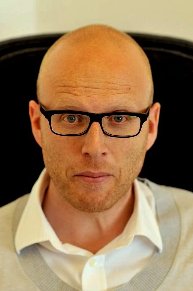 Why did you choose to become an economist?
Why did you choose to become an economist?
I started to become interested in economics in the 90s. When I was in high school we had a big economic crisis in Sweden, not unlike the crisis we have now in Spain. And I saw the public debate where people had differing views that were irreconcilable with each other. I wanted to learn economics so I could understand it myself and see which arguments were valid. So I started my undergrad studies in Sweden and later I continued with my PhD at the EUI (The European University Institute) in Florence.
What is your current research?
Mostly my research is about methodological issues about how to model economies where individual agents know different things about things that all the agents care about. So you can think about how a lot of economic decisions depend on the actions of other agents in an economy. For example, if you’re a firm that wants to invest, you would like to know how much your competitors are investing; or if you’re a trader in the stock market or bond market you might be interested in knowing what other traders are willing to pay for a bond at the next trading opportunity.
Once agents have different information, predicting other peoples’ actions becomes more difficult, because you don’t know the same things anymore. And I’m trying to solve these models on how to predict the actions of others. I may want to predict the actions that other agents are taking, and they are trying to predict the actions that I am taking. And since their actions will depend on their expectations of my actions, I need to form predictions about their predictions of my expectations. So we run into methodological issues and try to understand how to solve these dilemma models.
In the paper you presented at CERGE-EI (‘Man-Bites-Dog Business Cycles’) you proposed some information structures which are different from the existing literature on ‘rational inattention.’ Can you tell us about it?
So my paper “Man-Bites-Dog Business Cycles” features one specific feature of news media: unusual events are considered more ‘newsworthy’ than more common events. The title of the paper refers to how when a dog bites a man it is normal, but it is unusual when a man bites a dog. It is only the latter event that will make news.
In the context of the paper, this means that when you have unusual macroeconomic developments like a crisis or a boom, the mainstream media is more likely to focus on the economy. Since the news media is more likely to focus on the economy when we have a recession or a boom, it influences the business cycle. In particular, I show that this intense media focus can exacerbate things—you get stronger booms and recessions than you would otherwise.
Very interesting. What are your main conclusions?
My main finding is that the economy appears to respond strongly to shocks that don’t seem large enough to really justify the types of crises we observe. The model shows how we have sometimes extremely strong responses to only small changes in fundamentals. So even if there is only a small change in productivity, you have a very large change in output, and vice-versa. And this can be partly explained by the intense media focus.
So in this sense, the media focus on the economy is a bad thing?
I don’t show in the paper that this is suboptimal. It’s still possible that this media response is good, that a strong response is appropriate. I don’t really discuss this.
We students are making decisions about our topics for our PhD thesis. Where is the gap in economic research today?
You shouldn’t think too much about it. When you choose a topic as a PhD student you should choose something that you find interesting enough to work on—something you are willing to spend 60-70 hours a week on it for three years. Some people find it’s interesting to work on new things and they’ve identified some gaps in economic thinking they think are important. And I think that’s great, and that’s often very good research. But you shouldn’t artificially look for gaps, especially if you don’t find it interesting—and you won’t be able to convince other people that it’s interesting!
The most important thing is to work on something you find interesting yourself. Most people don’t think it’s interesting to repeat other people’s work, so in one sense it always means plugging some gap somewhere.
Dr. Nimark is a researcher at CREI (Centre de Recerca en Economia Internacional), adjunct professor at Universitat Pompeu Fabra, and affiliated professor at Barcelona GSE.
Read the paper Man-Bites-Dog Business Cycles
Interviewer: Sophio Khozrevanidze, 2nd Year PhD Student
Friday, 5 October 2012

